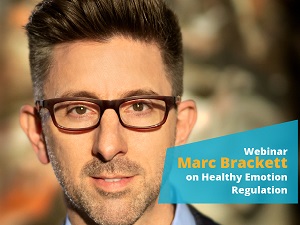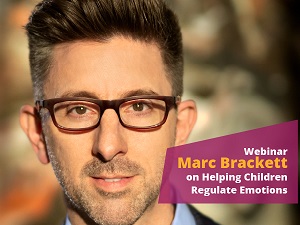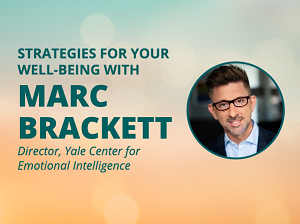
By Christina Bartolomeo
SML’s Webinars with Marc Brackett Can Help Us Handle Tough Times and Emotions
“Teachers often forget to help themselves. You can't pour from an empty cup!”
“I have been putting self on hold and making sure everyone else is OK.”
“I’m tired, stressed, and over it.”
“Lonely. Anxious. Drained. Exhausted.”
That's how teachers and school staff have described the emotional challenges they're facing during coronavirus, remote teaching and the transition back to the classroom. To help educators manage the COVID-19 times and the hard emotions that come with them, Share My Lesson enlisted Marc Brackett, author of Permission to Feel and director of the Yale Center for Emotional Intelligence, to provide three webinars about strategies to handle stress, anxiety, grief and anger right now—and help our students do the same. Engaging and practical, these webinars (available here, here and here) offer proven ways to manage emotional “overwhelm.” (Two of them also allow you to earn a professional development credit as well.)
Brackett’s approach is realistic and achievable, in contrast to the relentless and fuzzy positivism too often handed to those living or working under significant stress. He emphasizes regulating (or accepting and managing) rather than erasing our emotions. Among Brackett’s key tenets:
- Start by aiming for just a little more balance. If you’re spending 90 percent of the day in the “negative emotion zone” of anxiety, stress, loneliness, pessimism or boredom, just make it your goal to shift the proportions a bit to the positive side: finding calmness, joy, and satisfaction in what is right now.
- Move from being an “emotion judge” to an “emotion scientist.” An emotion judge views emotions as “error” and weakness; sees emotions as permanent; is critical of emotions or ignores them; and clumps emotions as “good” or “bad.” An emotion scientist accepts all emotions as helpful and revelatory; sees emotions as ephemeral and passing; and is open, curious and reflective. In other words, Brackett shows how some relief is possible just by accepting, versus judging or denying, our emotions.
- Understand that if it feels hard right now, it’s because it is hard. Brackett notes that chronic anxiety and stress are hardest to challenge when they’re unpredictable, uncontrollable and sustained—the trifecta we have with the pandemic. As he notes, “Currently, we have that dangerous trio. This makes us sense danger around the clock. Coupled with ‘resource depletion’—poor nutrition, sleep and exercise—our worst selves come out, and we behave irrationally.” Examples: Panic-buying toilet paper, saying hurtful things to our partners, or veering into catastrophic thinking (such as: “COVID-19 will never be over. I can’t go on this way for the rest of my life”).
- Practice “emotional regulation strategies.” These include mindful breathing; getting enough sleep, nutrition and exercise; positive self-talk; setting daily goals; self-compassion (giving ourselves permission to falter or fail, always a hard thing for educators!); and doing meaningful and joyful things, from your spiritual practice to your hobbies.
- Learn “reappraisal” (or “reframing”). This means telling yourself a different “story” about what’s happening right now. An example Brackett gives is switching our internal narrative from “I’m never going to make it, being at home for so long” to “Maybe this is an opportunity to learn and grow closer” to a partner or family member (remotely or in person, depending on your situation).
- Routines create certainty and relieve negative emotions, making us feel safer and calmer. Brackett believes that consistency in wake-up times, meals, exercise, work schedules, and playtime helps. As he puts it, “When we have too much time on our hands, our brains have time to make up stories!”
- Be a preventionist not an interventionist. In other words, take actions that make it less likely you will end up in a situation that causes anxiety. For example, don’t check social media or watch the news all day. Stay informed (not obsessively, but enough so that unrealistic fears or unfounded rumors get less of a foothold).
- Don’t expect to do it perfectly at first. “Strategies are developmental: Why do adolescents get a [learner’s] permit?” says Brackett. He notes that strategies require effortful practice to become healthy habits; they need to be evaluated and refined (as any teacher knows). He says, “We need a big tool bag: We need Plans B and C.”
Find out how these emotional management skills can also work for your students and your children. The series includes a special webinar for parents and educators: Helping Children Manage Emotions During Uncertain Times. The webinar emphasizes how the mere presence of a caring adult in a child’s life can help the child deal with emotions such as grief, anxiety and anger. The webinar covers: leading with compassion and empathy; giving a child undivided attention; listening for the story behind a child’s emotions; and finding out what a child is actually feeling vs. telling a child what he or she is feeling. It also shows you how to coach a child or student through “thought and action” strategies such as positive self-talk and creative problem-solving.
Feedback on SML Marc Brackett Webinars from Educators and Leaders
“Great seminar. Relieved to know that I am not alone.”
“Marc Brackett's webinar was amazing! I haven't felt this light and motivated in a long time!”
“This webinar was perfectly timed! … I found much of what Marc Brackett said to be applicable to myself and my students even after life returns to ‘normal.’ ”
We can’t make COVID-19 go away overnight, but we can make its emotional challenges a little less daunting. Explore the Health & Wellness Community to learn more about our self-care collection for educators and to register for the Marc Brackett webinars.
And if you’re looking for additional content with Marc Brackett, a free course is now available on Coursera, Managing Emotions in Times of Uncertainty and Stress. The course is available on a rolling basis through May 8, 2022.
"We are living at a time with no modern precedent: we are in the midst of a health pandemic, an economic recession, and a long overdue reckoning with racism. People are scared, frustrated, and anxious. We need to be able to manage the compounded stress and trauma everyone is experiencing, and this course is a tool to do that. The more we can equip our teachers to handle what we’re inevitably going to see in the classroom—in person or remotely—the more we will be able to manage our way through these global crises."
- AFT President Randi Weingarten
Sign Up for One of Marc Brackett's On-Demand Webinars Below:
Christina Bartolomeo is an Assistant Director in the Communications Department of the American Federation of Teachers.



